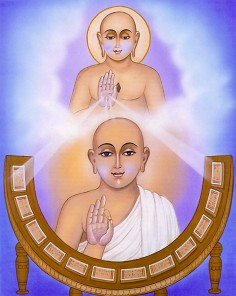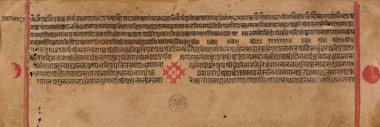Thirteenth Lecture: Chitra and Sambhūta[1]
Being contemptuously treated for the sake of his birth (as a Chāṇḍāla) Sambhūta took, in Hastināpura, the sinful resolution (to become a universal monarch in some later birth); descending from the heavenly region Padmagulma, he was born of Chulanī in Kāmpilya as Brahmadatta; Chitra, however, was born in the town Purimatāla in the great family of a merchant; when he had heard the Law, he entered the order. (1, 2)
In the town Kāmpilya, both Sambhūta and Chitra (as they were called in a former birth) met again and told each other the reward they had realised for their good and bad actions. (3)
The universal monarch Brahmadatta, the powerful and glorious king, respectfully addressed the following words to him (who had been) his brother (in a former birth): (4)
We were brothers once, kind to each other, loving each other, wishing well to each other. (5)
"We were slaves in the country of the Daśārṇas, then antelopes on mount Kālañjara, then geese on the shore of Mṛtagaṅgā, and Śvapākas in the land of Kāśi. (6)
"And we were gods having great power, in the regions of the gods. This is our sixth birth, in which we are separated from each other." (7)
"Karman is produced by sinful thoughts, and you have entertained them, O king; it is by the influence of this Karman that we were separated." (8)
"I had done actions derived from truth and purity, and now I enjoy their effect; is this also true in your case, Chitra?" (9)
"Every good deed will bear its fruit to men; there is no escape from the effect of one's actions. Through riches and the highest pleasures my soul has got the reward for its virtues. (10)
"Know, Sambhūta, that you have got the reward of your virtues in the shape of great wealth and prosperity; but know, O king, that is just so with Chitra; he also obtained prosperity and splendour. (11)
"A song of deep meaning condensed in words has been repeated in the midst of a crowd of men, (having heard) which monks of piety and virtues exert themselves in this (religion): I have become a Śramaṇa." (12)
"Renowned are my beautiful palaces Ucca, Udaya, Madhu, Karka, and Brahman: this house, full of treasures and containing the finest products of the Pañchālas, O Chitra,[2] regard it as your own! (13)
"Surround yourself with women who dance, and sing, and make music; enjoy these pleasures, O monk; I deem renunciation a hard thing." (14)
As the virtuous Chitra, for old friendship's sake, loved the king who was attached to sensual pleasures, and as he had at heart his welfare, he spoke to him the following words: (15)
"All singing is but prattle, all dancing is but mocking, all ornaments are but a burden, all pleasures produce but pains. (16)
"O king, pleasures which the ignorant like, but which produce pains, do not delight pious monks who care not for pleasure, but are intent on the virtues of right conduct. (17)
"Excellent king, the lowest caste of men is that of the Śvapākas, to which we twice belonged; as such we were loathed by all people, and we lived in the hamlets of Śvapākas. (18)
"In that miserable birth we lived in the hamlets of Śvapākas, detested by all people; then we acquired the Karman (the fruit of which we now enjoy). (19)
"You are now a king of great power and prosperity, enjoying the reward of your good actions; put from you the transitory pleasures, and enter the order for the sake of the highest good![3] (20)
"He who in this life has done no good actions and has not practised the Law, repents of it in the next world when he has become a prey to Death. (21)
"As a lion takes hold of an antelope, so Death leads off a man in his last hour; neither mother, nor father, nor brother will, at that time, save a particle (of his life). (22)
"Neither his kinsmen, nor his friends, nor his sons, nor his relations will share his suffering, he alone has to bear it; for the Karman follows the doer. (23)
"Leaving behind bipeds and quadrupeds, his fields, his house, his wealth, his corn, and everything; against his will, and accompanied only by his Karman,[4] he enters a new existence, either a good or a bad one. (24)
"When they have burned with fire on the funeral pile his forlorn, helpless corpse, his wife and sons and kinsfolk will choose another man to provide for them. (25)
"Life drags on (towards death) continuously;[5] old age carries off the vigour of man. King of the Pañchālas, mark my words: do no fearful actions." (26)
"I, too, know just as well as you, O saint, what you have told me in your speech: pleasures will get a hold on men and are not easily abandoned by such as we are, sir. (27)
"O Chitra, in Hastināpura[6] I saw the powerful king (Sanatkumāra), and I took that sinful resolution in my desire for sensual pleasures. (28)
And since I did not repent of it, this has come of it, that I still long for sensual pleasures, though I know the Law. (29)
"As an elephant, sinking down in a quagmire, sees the raised ground but does not get to the shore, so do we who long for sensual pleasures, not follow the path of monks. (30)
"Time elapses and quickly pass the days; the pleasures of men are not permanent; they come to a man and leave him just as a bird leaves a tree void of fruit." (31)
"If you are unable to abandon pleasure, then do noble actions, O king; following the Law, have compassion on all creatures: then you will become a god on entering a new existence. (32)
"If you have no intention of abandoning pleasure, and still long for undertakings and property, my long talk has been to no purpose. I go, king, farewell." (33)
And Brahmadatta, king of the Pañchālas, did not act on the counsel of the saint; he enjoyed the highest pleasure, and (afterwards) sank into the deepest hell. (34)
But Chitra the great sage, of excellent conduct and penance, was indifferent to pleasure; after he had practised the highest self-control, he reached the highest place of perfection. (35)
Thus I say.
The stories about Chitra and Sambhūta and the fate they underwent in many births are common to Brahmans, Jainas, and Buddhists. The whole subject has been exhaustively dealt with by Prof. Leumann in two learned papers in the Winer Zeitschrift fūr die Kunde des Morgenlandes, vol. V, pp. I ff., III ff., where an analysis of the various documents which relate this legend is given, and the Prākṛt text of the Thirteenth and Fourteenth Lectures together with a German translation is published. For all details, therefore, the reader is referred to Prof. Leumann's papers.
The commentator constructs Chitra with dhaṇappabhūya: full of manifold treasures; but Prof. Leumann is probably right in taking it as a vocative
This might be translated, as Professor Leumann suggests: possessing Karman as the germ (of his future destiny); still I prefer the meaning vouched for by the commentators, because karmabīja generally means the germ, i.e. cause of Karman, see below, Thirty-second Lecture, verse 7
When Sunandā, wife of Sanatkumāra, paid homage to Sambhūta, then a Jaina monk, and touched his feet with the curls of her soft hair, he was possessed by the desire to become a universal monarch in reward for his penances. This is the nidāna of which the text speaks, and what I render in this connection by "taking a resolution." For the story itself, see my Ausgewählte Erzählungen in Māhārāṣṭrī, p. 5 f.
 Ganadhar Sudharma Swami
Ganadhar Sudharma Swami
